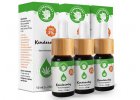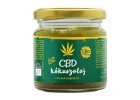Hemp oil
Cold-pressed oil by hemp seed is, according to studies, the best plant-based oil for human health. It is even better than olive oil due to its ideal ratio of essential omega-3, 6, and 9 unsaturated fatty acids. Hemp oil is a rich source of these acids and also contains minerals and chlorophyll. It is best used in cold dishes (not recommended for frying), such as salads or spreads, where its delicate nutty flavor is appreciated. Alternatively, it can be consumed daily—one tablespoon—to supplement essential nutrients that the body cannot produce on its own.
At Cannadorra, you can find organic (BIO) hemp oil from both ecological and conventional farming. Additionally, we offer hemp oil for animals in feed quality and a hemp oil blend with fish oil, naturally enriched with CBD.
#ShowMore#
Instructions for using hemp oil
- Hemp oil is used in cooking – in salads, spreads.
- DO NOT FRY OR HEAT THE OIL TOO MUCH!
- One tablespoon of oil per day provides the body with essential nutrients.
Effects of hemp oil
Hemp oil has a positive effect on heart function, cholesterol levels, blood glucose levels, normal skin condition, and muscle and joint function.
How is hemp oil made?
Cannadorra's hemp oils are produced by pressing hemp seeds (Cannabis sativa), also known as industrial hemp. The pressing process is cold-pressed, meaning no refining takes place. This ensures that the oil retains its vitamins and minerals. It has a pleasantly nutty taste and aroma, as well as a light to dark green color. It is suitable not only for culinary use but also for cosmetics.
What does hemp oil contain?
- Omega 3, 6, and 9 unsaturated fatty acids
- Vitamins: A, B, C, D, E, and K
- Minerals: potassium, magnesium, iron, and calcium
- Phytosterol and chlorophyll
- Enzymes
- Gamma-linolenic acid
How long does hemp oil last?
Always follow the expiration date on the packaging. Once opened, store hemp oil in the refrigerator. In this case, it will last for at least six months. However, after six months, oxidation begins to reduce the vitamin, mineral, and beneficial compound content. You don’t have to throw it away—rather than consuming it, you can use it as a skin treatment (suitable for cellulite and stretch marks).
3 Steps to Extend shelf life – How to store it properly
If you follow these steps, our oils will last for up to six months:
- After each use, seal the cap tightly to prevent oxidation and spoilage.
- Store in a dark place – ideally in the refrigerator.
- Choose a cool location – the temperature should not exceed 16°C.
How to use hemp oil?
Our pure hemp oils are best used in the kitchen. They serve as an excellent dressing for salads or pasta, or you can drizzle them on a slice of bread and eat them as is. They are a great substitute for animal fats.
We recommend using them in cold dishes—get inspired by hemp recipes. Hemp oil is not suitable for frying, as heat would degrade its quality. Our cold-pressed oils have a pleasantly nutty flavor and a light to dark green hue.
For internal use, we recommend taking one tablespoon daily, either on its own or in food. For children, 2 to 3 teaspoons can be added to yogurt, for example. In cases of constipation, take one teaspoon daily in the morning on an empty stomach.
For external use, such as for skin problems, gently apply directly to affected areas. The pleasant nutty taste of hemp oil will win everyone over.
What does it mean when hemp oil has an organic certification?
The organic quality certificate for all certified foods guarantees that they have been grown and produced in accordance with the principles of organic farming. This means they are grown without the use of artificial fertilizers or pesticides and are not genetically modified. Of course, there are more criteria that certified organic foods must meet.
It has been proven that organic-quality foods have a more positive impact on human health than non-certified foods.
Organic-quality foods have a beneficial effect on our health.
Nutritional comparison of high-quality vegetable oils
| Nutritional Values per 100 g | Saturated Fats | Polyunsaturated | Omega 3 | Omega 3 SDA Stearidonic Acid | Omega 6 | Omega 6 GLA Gamma-Linolenic Acid | Omega 6/Omega 3 Ratio (Ideal: 2:1 – 4:1) |
|---|---|---|---|---|---|---|---|
| Hemp Oil | 9.2 g | 78 g | 18.7 g | 1.6 g | 56.6 g | 3.3 g | 3:1 |
| Olive Oil | 14.3 g | 8.2 g | 0.7 g | 0 g | 7.5 g | 0 g | 10.7:1 |
| Rapeseed Oil | 6.6 g | 29.3 g | 9.6 g | 0 g | 19.7 g | 0 g | 2.1:1 |
| Sunflower Oil | 12 g | 63.3 g | 0.1 g | 0 g | 63.2 g | 0 g | 0.2:1 |
| Flaxseed Oil | 9.4 g | 66 g | 53.3 g | 0 g | 12.7 g | 0 g | 88:1 |
| Argan Oil | 9.4 g | 66 g | 53.3 g | 0 g | 12.7 g | 0 g | 0.2:1 |
| Pumpkin Oil | 20 g | 47.7 g | 0.4 g | 0 g | 47.3 g | 0 g | 118:1 |
| Walnut Oil | 9.1 g | 69.9 g | 11.5 g | 0 g | 58.4 g | 0 g | 5.1:1 |
Comparison of High-Quality vegetable oils with explanations
| Oil | Advantages |
|---|---|
| Hemp Oil | Naturally contains Omega 3 (including Omega 3 SDA, a more effective form). It has one of the lowest levels of saturated fats and the highest content of polyunsaturated fats (essential fatty acids) among all table oils. Contains GLA (usually found in evening primrose oil). Also has the ideal "golden" Omega 6 to Omega 3 ratio. |
| Olive Oil | Hemp oil has 40% less saturated fat than olive oil. Olive oil contains almost no Omega 3. In fact, hemp oil has 25 times more Omega 3 than olive oil. |
| Rapeseed Oil | Rapeseed oil has 50% less Omega 3 than hemp oil. It is often used for frying. |
| Sunflower Oil | Sunflower oil contains no Omega 3. Due to its high Omega 6 content, it increases the Omega 3 deficiency in a typical diet. |
| Flaxseed Oil | Although flaxseed oil has a higher Omega 3 content than hemp oil, it lacks the proper Omega 6 to Omega 3 ratio. Over time, flaxseed oil could lead to an Omega 6 deficiency. Additionally, the Omega 3 in flaxseed oil is only in the ALA form (a short-chain fatty acid). Flaxseed does not contain any SDA (a more effective form of Omega 3 found in hemp oil). Unlike hemp oil, it is not very suitable for regular cooking and must be stored exclusively in the refrigerator. |
| Argan Oil | Argan oil contains very little Omega 3. It is sourced exclusively from Morocco, making it very expensive and less accessible than Zelená Země's hemp oil. |
| Pumpkin Oil | Pumpkin oil contains very little Omega 3. It is also significantly more expensive and less available than Cannadorra's hemp oil. |
| Walnut Oil | Similar to hemp oil, walnut oil also contains Omega 3—though one-third less. The Omega 6 to Omega 3 ratio is much better in hemp oil. |
What is the difference between hemp oil and CBD drops?
Both products have the same base—oil pressed from hemp seeds. While pure hemp oil is primarily used in gastronomy (e.g., as a dressing for pasta or salads), hemp drops are mainly used as a dietary supplement. They are taken in much smaller amounts—one to several drops per day, depending on the type.
CBD drops also contain CBD (cannabidiol), which has proven positive effects on human health. See CBD effects for more information.
Product sorting
List of products

Hemp seed oil is a superior source of omega-3 and omega-6 fatty acids. Tastier and more beneficial than olive oil, it offers essential nutrients with a light hazelnut flavor.

Hemp seed oil is an excellent source of omega-3 and omega-6 fatty acids. Tastier and more beneficial than olive oil, it provides essential nutrients with a light hazelnut flavor.

CBD Hemp Oil 20% is a unique dietary supplement that supports the immune system and promotes the body’s natural processes. This full-spectrum oil contains 1970mg of CBD.

Our 10% CBD Oil is a unique dietary supplement that provides a full spectrum of cannabinoids to support your immune system and enhance your body's natural processes. This...

CBD Oil - food supplement, full-spectrum of cannabinoids, 475mg CBD, mixed with organic hemp seed oil. Promotes immunity and has a beneficial effect on the natural processes of...
Listing controls
Hemp oil is medicine, not a drug
All products offered in our e-shop are made from industrial hemp, which does not contain the psychoactive substance THC. This means that hemp oil is completely legal and has no intoxicating effects. You also do not have to worry about addiction.
The main health benefits are:
- Helps maintain normal skin condition
- Has anti-inflammatory properties
- Maintains normal blood glucose levels
- Contributes to normal muscle and joint function
- Supports normal cardiovascular function and helps maintain healthy cholesterol levels
- Supports the body’s natural defenses
In addition, hemp oil contains the ideal ratio of unsaturated fatty acids that are essential for the body!
Why cold-pressed hemp oil?
Hemp oil is often cold-pressed because this process preserves most of the nutrients and beneficial compounds found in hemp seeds.
Here are several reasons why cold pressing is used:
- Nutrient preservation: Cold pressing allows for the retention of a high content of nutrients present in hemp seeds, including essential fatty acids (omega-3 and omega-6), vitamins (especially vitamin E), and minerals.
- Flavor and aroma protection: Cold pressing minimizes heat damage to the oil, which helps maintain the natural flavor and aroma of hemp oil.
- Prevention of oxidative damage: Cold pressing reduces the risk of oxidation, which can damage nutrients and produce unwanted compounds.
- Health benefits: By preserving a higher content of nutrients and beneficial compounds, cold-pressed hemp oil can be a healthier choice with numerous potential health benefits.
Overall, cold pressing enables the production of high-quality hemp oil while retaining as many nutrients and beneficial substances as possible. This process is preferred to obtain the best quality for human consumption.
How to recognize high-quality hemp oil?
Here are a few tips on how to identify high-quality hemp oil:
- Production method: High-quality hemp oil is often produced through cold pressing, which helps preserve as many nutrients and beneficial compounds from the hemp seeds as possible. Check if the manufacturer provides information about the production process.
- Source of raw materials: The hemp seeds used for production should come from high-quality, organically grown hemp plants. Raw materials from poor-quality sources can lead to lower-quality oil.
- Certification: Look for hemp oil with organic or eco-certification. Certification confirms that the hemp seeds were grown without synthetic fertilizers, pesticides, or herbicides.
- Taste and aroma: Good-quality hemp oil should have a pleasant taste and aroma. Oils with an unpleasant smell or taste may indicate poor quality or oxidation.
- Transparent manufacturer information: The manufacturer should provide clear details about the product, including the source of raw materials, production process, cannabinoid content, and testing results.
Keep in mind that high-quality hemp oil may fall into a higher price category, but investing in a premium product can have a positive impact on your health and well-being.





























